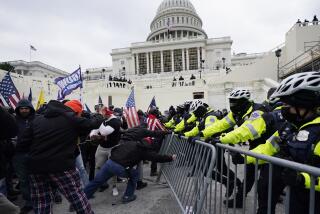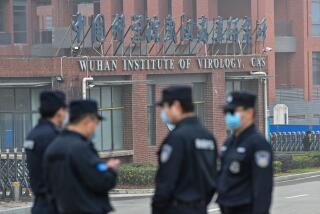Bush Goes Public With Terror Study
- Share via
WASHINGTON — Declassified portions of a high-level intelligence report released Tuesday describe the war in Iraq as a major catalyst for Islamic radicalism around the world, while also citing other causes for the expanding terrorist threat.
President Bush took the highly unusual step of releasing key findings of the classified intelligence study in an attempt to blunt a growing furor in Washington over news reports this week in which intelligence officials described sections of the document that indicate the war in Iraq has made the terrorism problem worse. The White House said the initial news stories about the National Intelligence Estimate, a report offering a consensus view of U.S. intelligence agencies, did not represent the whole document.
But the release of its principal findings appeared likely to fuel the election-season debate over the impact of the war in Iraq, and provided scant support for the president’s position that the U.S. occupation of the country has made America safer.
At a White House news conference, Bush lashed out at what he suggested was a politically motivated leak of the report’s conclusions, and at critics who have cited the intelligence estimate to question his administration’s course in Iraq and argue that the drawn-out conflict is adding to the danger of terrorism.
“Some people have, you know, guessed what’s in the report and have concluded that going into Iraq was a mistake,” Bush said, appearing alongside Afghan President Hamid Karzai. “I strongly disagree. I think it’s naive. I think it’s a mistake for people to believe that going on the offense against people that want to do harm to the American people makes us less safe.”
The section released by the White House does not include an explicit conclusion that the war in Iraq has increased the terrorist threat to Americans. But the thrust of the report’s “key judgments” is that the terrorist danger is morphing and growing and that the Iraq war is a major contributing force in that trend.
“We assess that the Iraq jihad is shaping a new generation of terrorist leaders and operatives,” reads one of the main conclusions of the report.
“The Iraq conflict has become the ‘cause celebre’ for jihadists, breeding a deep resentment of U.S. involvement in the Muslim world and cultivating supporters for the global jihadist movement.”
Among other findings, the report said that Al Qaeda was exploiting the war in Iraq to attract new donors and recruits; that fighters with experience in Iraq were likely to function as leaders in a new generation of militants; and that foreign Al Qaeda fighters were free to leave the country and focus on other targets as more Iraqi militants took their place within Iraq.
Bush did not say who he thought leaked the classified report. Atty. Gen Alberto R. Gonzales indicated Tuesday that the Justice Department could investigate the disclosure once the agency that classified the report -- in this case the director of national intelligence -- reported the leak.
Bush said he ordered the key judgments declassified -- four pages out of the 30-page document -- so that “everybody can draw their own conclusions about what the report says.” Other officials said it was designed to bolster statements from administration officials in recent days that the report was wide-ranging, and that assessing the impact of the Iraq war was not its main focus.
The portion made public includes six references to the conflict in Iraq, describing it as a recruiting tool for Islamic fundamentalists, a training ground for Muslim fighters and a laboratory for lethal new terrorist methods that are increasingly being exported to other countries.
Overall, the excerpt offers a bleak assessment of the evolving terrorist threat.
Although counter-terrorism operations have damaged the leadership of Al Qaeda, the report concludes that the global jihadist movement “is spreading and adapting to counter-terrorism efforts,” and that if current trends continue, “threats to U.S. interests at home and abroad will become more diverse, leading to increasing attacks worldwide.”
The threat from “self-radicalized cells will grow in importance to U.S. counter-terrorism efforts,” according to the report, which described Europe as “an important venue for attacking Western interests.”
The document even warns that rising anti-U.S. sentiment could fuel other radical ideologies, prompting leftist, nationalist or separatist groups in other parts of the world “to adopt terrorist methods to attack U.S. interests.”
The National Intelligence Estimate represents the U.S. intelligence community’s most authoritative and comprehensive examination of global terrorism trends. The document was produced by a senior group of analysts under the direction of National Intelligence Director John D. Negroponte.
The report, titled “Trends in Global Terrorism: Implications for the United States” was completed in April. Some members of Congress were briefed on the report this year, but its conclusions on Iraq were not publicly disclosed until this week, when The Times and other news organizations published articles based on accounts from government officials familiar with its contents.
The NIE lists other factors contributing to the growth in Islamic fundamentalism, including “entrenched grievances” among Muslims such as “fear of Western domination” as well as the slow pace of economic, social and political reforms in many Muslim nations.
It identifies factors that could curb the spread of Islamic extremism, including the limited appeal of militant ideology. The document also indicates that a string of setbacks for insurgents in Iraq could mean that “fewer fighters will be inspired to carry on the fight.”
Frances Fragos Townsend, assistant to Bush for homeland security, told reporters that suggestion “underscores the president’s point about the importance of our winning in Iraq.”
Even so, the excerpt concludes that the “factors fueling the spread of the movement outweigh its vulnerabilities,” suggesting that Islamic radicalization is likely to grow in strength.
Democrats pounced on the report.
“What I conclude from it is that our failed strategy in Iraq has made the world more dangerous,” said Rep. Jane Harman (D-Venice), the ranking Democrat on the House Intelligence Committee. Harman said the declassification of the document could have immediate repercussions, shifting debate on Capitol Hill away from the White House agenda.
Sen. John D. “Jay” Rockefeller IV (D-W.Va.), the ranking Democrat on the Senate Intelligence Committee, said the report’s judgments “make it clear that the intelligence community -- all 16 agencies -- believe the war in Iraq has fueled terrorism.”
Republicans downplayed the report’s language on Iraq, and pointed out that most of the document’s findings are consistent with previous reports and testimony describing terrorist networks as increasingly decentralized.
“Despite Democrats’ dubious claims, the NIE report indicates that America’s success against Al Qaeda has led to the enemy becoming more diffuse and independent,” said House Majority Leader John A. Boehner (R-Ohio).
In his news conference with Karzai, Bush sought to refute the suggestion that the war was exacerbating the terror problem by ticking off attacks against American targets before the invasion. He mentioned the 1993 car bombing of the World Trade Center, the 1998 bombings of American embassies in east Africa, and the 2000 attack on the U.S. warship Cole in a Yemen harbor.
“To suggest that if we weren’t in Iraq we would see a rosier scenario with fewer extremists joining the radical movement requires us to ignore 20 years of experience,” Bush said. “The best way to protect America is defeat these killers overseas so we do not have to face them here at home.”
But the implication that there was a connection between Baghdad and any of those attacks -- or the Al Qaeda terrorist network -- was not supported by intelligence estimates before the war, and has been widely discredited since.
At one point, Bush defended the invasion by saying the war on terrorism requires “going on the offense against people that want to do harm to the American people.”
However, the most comprehensive intelligence estimate on Iraq before the war -- a National Intelligence Estimate published in October 2002 -- concluded that Baghdad was “drawing a line short of conducting terrorist attacks” against the United States, and that only “if sufficiently desperate” was Hussein likely to seek a partnership with a terrorist organization such as Al Qaeda.
More recently, the Republican-controlled Senate Intelligence Committee concluded a two-year investigation that turned up no evidence that Hussein had ties to Al Qaeda or was plotting against the United States. Instead, the report found that the Iraqi leader had issued a general order barring anyone in his government from having dealings with the terrorist network.
American intelligence agencies are working on an NIE that focuses exclusively on the conflict in Iraq. Townsend said the report is scheduled to be completed in January. Harman said she is concerned that the administration is seeking to delay release of the document until after the November elections.
*
More to Read
Sign up for Essential California
The most important California stories and recommendations in your inbox every morning.
You may occasionally receive promotional content from the Los Angeles Times.










